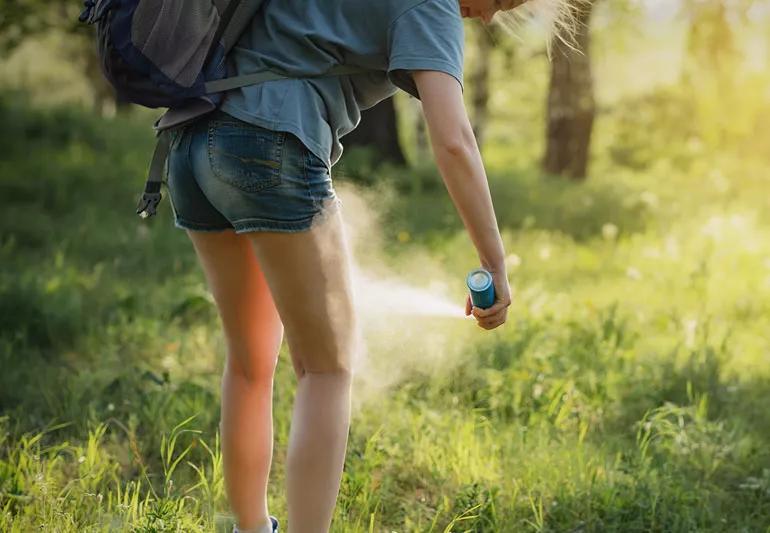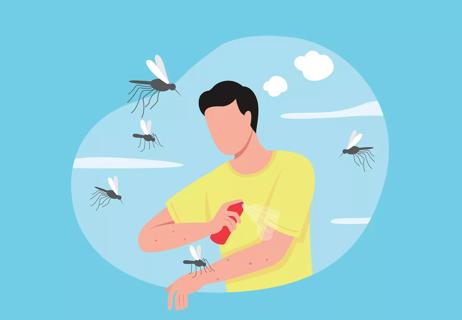And find out if they're safe or not

Like a moth to a flame, biting insects are there to ruin every warm-weather affair. So how do you make them scram so you can enjoy the great outdoors? Family medicine specialist Donald Ford, MD, shares the science behind bug sprays and gives tips to help you avoid becoming their catch of the day.
Advertisement
Cleveland Clinic is a non-profit academic medical center. Advertising on our site helps support our mission. We do not endorse non-Cleveland Clinic products or services. Policy
When you put bug repellent on your skin, it immediately starts evaporating, forming an invisible cloud of chemicals around you. (Think: Pig-Pen from Charlie Brown.)
“Insects perceive these chemicals in the air and stay away,” says Dr. Ford.
When it comes to bug bites, an ounce of prevention is worth a pound of cure. Insect bites range from annoying to deadly — they can also be irritating, painful and ultimately lead to disease.
“There are significant mosquito-borne diseases. We don’t see too many in the northern part of the United States. They exist more in the southern United States, southern parts of the world, the Caribbean and South America,” says Dr. Ford. “Malaria is the most well-known and causes the most damage. Yellow fever has also been a significant problem worldwide.”
Other illnesses caused by biting insects include:
Advertisement
On the shortlist of effective bug repellents, two active ingredients reign supreme:
And if you’re looking for a one-two punch, Dr. Ford says the insecticide permethrin is fairly effective. However, you need to use it very carefully.
“You can either buy permethrin-treated clothing or apply it to clothing yourself. That plus DEET is the most effective strategy for repelling insects. You should not apply permethrin directly to the skin, but once it’s dried on clothing, it’s OK to wear.”
While bug sprays sometimes get a bad rap, Dr. Ford says they are safe. “The amount of chemicals absorbed into the skin is very low. Even in those low amounts, there are no recognized toxic effects.”
In fact, the U.S. Environmental Protection Agency (EPA) has said DEET is safe for use in both children and adults. “The harm comes when people ingest these chemicals,” notes Dr. Ford. “So use caution when applying repellents on children since kids are more likely to touch their skin, put their hands in their mouth or touch their eyes. We also recommend washing your hands after you apply. And use products labeled safe for children because they have slightly lower chemical concentrations.”
Are natural mosquito repellents and bug sprays effective?
Not sold on chemical bug sprays? Dr. Ford says the oil of lemon eucalyptus is the way to go if you prefer all-natural repellents.It comes from the leaves of the lemon eucalyptus tree, which grows in Australia. “Its active ingredient is PMD (para-menthane-3,8-diol), but it’s thought to be less effective than DEET and picaridin,” he says. “Beyond that, no other oils or natural products have been proven effective. That includes citronella, which sometimes is sold for use on the skin or as a candle.”
Advertisement
Learn more about our editorial process.
Advertisement

Keep ‘mozzies’ at bay by avoiding scented body products, beer and certain colored clothes

Vanilla extract won’t keep mosquitoes away for long, if at all — and could even attract other bugs, like wasps or flies

Alpha-gal syndrome has become more common and is a leading cause of anaphylaxis

These red, raised bites often show up in a zigzag pattern on areas of your skin that come into contact with bedding

Twice daily tick checks, the right bug sprays and long pants can help you prevent tick-borne diseases

Bug bites create tiny openings in your skin that can let in dangerous bacteria

Using insect repellent, covering up and keeping your property dry can help keep the buggers at bay

Kissing bugs are insects that can carry a dangerous parasite that causes Chagas disease

Wearing a scarf, adjusting your outdoor activities and following your asthma treatment plan can help limit breathing problems

Your diet in the weeks, days and hours ahead of your race can power you to the finish line

When someone guilt trips you, they’re using emotionally manipulative behavior to try to get you to act a certain way